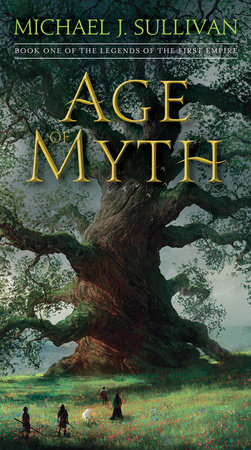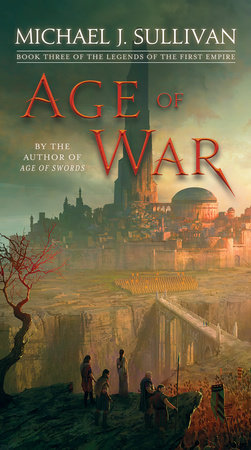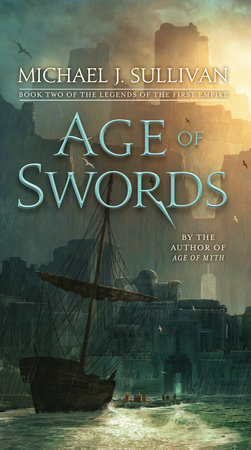Excerpt
Age of Myth
Chapter One
Of Gods and Men
In the days of darkness before the war, men were called Rhunes. We lived in Rhuneland or Rhulyn as it was once known. We had little to eat and much to fear. What we feared most were the gods across the Bern River where we were not allowed. Most people believe our conflict with the the Fhrey started at the Battle of Grandford, but it actually began on a day in early spring when two men crossed the river.
—The Book of Brin
Raithe’s first impulse was to pray. Curse, cry, scream, pray—people did such things in their last minutes of life. But praying struck Raithe as absurd given that his problem was the angry god twenty feet away. Gods weren’t known for their tolerance, and this one appeared on the verge of striking them both dead. Neither Raithe nor his father had noticed the god approach. The waters of the nearby converging rivers made enough noise to mask an army’s passage. Raithe would have preferred an army.
Dressed in shimmering clothes, the god sat on a horse and was accompanied by two servants on foot. They were men, but dressed in the same remarkable clothing. All three silent, watching.
“Hey?” Raithe called to his father.
Herkimer knelt beside a deer, opening its stomach with his knife. Earlier, Raithe had landed a spear in the stag’s side, and he and his father had spent most of the morning chasing it. Herkimer had stripped off his wool leigh mor as well as his shirt because opening a deer’s belly was a bloody business. “What?” He looked up.
Raithe jerked his head toward the god, and his father’s sight tracked to the three figures. The old man’s eyes widened, and the color left his face.
I knew this was a bad idea, Raithe thought.
His father had seemed so confident, so sure that crossing the forbidden river would solve their problems. But he’d mentioned his certainty enough times to make Raithe wonder. Now the old man looked as if he’d forgotten how to breathe. Herkimer wiped his knife on the deer’s side before slipping it into his belt and getting up.
“Ah . . .” Raithe’s father began. Herkimer looked at the half-gutted deer, then back at the god. “It’s . . . okay.”
This was the total sum of his father’s wisdom, his grand defense for their high crime of trespassing on divine land. Raithe wasn’t sure if slaughtering one of the deities’ deer was also an offense but assumed it didn’t help their situation. And although Herkimer said it was okay, his face told a different story. Raithe’s stomach sank. He had no idea what he’d expected his father to say, but something more than that.
Not surprisingly, the god wasn’t appeased, and the three continued to stare in growing irritation.
They were on a tiny point of open meadowland where the Bern and Urum rivers met. A pine forest, thick and rich, grew a short distance up the slope behind them. Down at the point where the rivers converged lay a stony beach. Beneath a snow-gray blanket of sky, the river’s roar was the only sound. Just minutes earlier Raithe had seen the tiny field as a paradise. That was then.
Raithe took a slow breath and reminded himself that he didn’t have experience with gods or their expressions. He’d never observed a god up close, never seen beech-leaf-shaped ears, eyes blue as the sky, or hair that spilled like molten gold. Such smooth skin and white teeth were beyond reason. This was a being born not of the earth but of air and light. His robes billowed in the breeze and shimmered in the sun, proclaiming an otherworldly glory. The harsh, judgmental glare was exactly the expression Raithe expected from an immortal being.
The horse was an even bigger surprise. Raithe’s father had told him about such animals, but until then Raithe hadn’t believed. His old man had a habit of embellishing the truth, and for more than twenty years Raithe had heard the tales. After a few drinks, his father would tell everyone how he’d killed five men with a single swing or fought the North Wind to a standstill. The older Herkimer got, the larger the stories grew. But this four-hooved tall tale was looking back at Raithe with large glossy eyes, and when the horse shook its head, he wondered if the mounts of gods understood speech.
“No, really, it’s okay,” Raithe’s father told them again, maybe thinking they hadn’t heard his previous genius. “I’m allowed here.” He took a step forward and pointed to the medal hanging from a strip of hide amid the dirt and pine needles stuck to the sweat on his chest. Half naked, sunbaked, and covered in blood up to his elbows, his father appeared the embodiment of a mad barbarian. Raithe wouldn’t have believed him, either.
“See this?” his father went on. The burnished metal clutched by thick ruddy fingers reflected the midday sun. “I fought for your people against the Gula-Rhunes in the High Spear Valley. I did well. A Fhrey commander gave me this. Said I earned a reward.”
“Dureyan clan,” the taller servant told the god, his tone somewhere between disappointment and disgust. He wore a rich-looking silver torc around his neck—both servants did. The jewelry must be a mark of their station.
The gangly man lacked a beard but sported a long nose, sharp cheeks, and small clever eyes. He reminded Raithe of a weasel or a fox, and he wasn’t fond of either. Raithe was also repulsed by how the man stood: stooped, eyes low, hands clasped. Abused dogs exhibited more self-esteem.
What kind of men travel with a god?
“That’s right. I’m Herkimer, son of Hiemdal, and this is my son Raithe.”
“You’ve broken the law,” the servant stated. The nasal tone even sounded the way a weasel might talk.
“No, no. It’s not like that. Not at all.”
The lines on his father’s face deepened, and his lips stretched tighter. He stopped walking forward but held the medal out like a talisman, his eyes hopeful. “This proves what I’m saying, that I earned a reward. See, I sort of figured we”—he gestured toward Raithe—“my son and I could live on this little point.” He waved at the meadow. “We don’t need much. Hardly anything, really. You see, on our side of the river, back in Dureya, the dirt’s no good. We can’t grow anything, and there’s nothing to hunt.”
The pleading in his father’s voice was something Raithe hadn’t heard before and didn’t like.
“You’re not allowed here.” This time it was the other servant, the balding one. Like the tall weasel-faced fellow, he lacked a proper beard, as if growing one were a thing that needed to be taught. The lack of hair exposed in fine detail a decidedly sour expression.
“But you don’t understand. I fought for your people. I bled for your people. I lost three sons fighting for your kind. And I was promised a reward.” Herkimer held out the medal again, but the god didn’t look at it. He stared past them, focusing on some distant, irrelevant point.
Herkimer let go of the medal. “If this spot is a problem, we’ll move. My son actually liked another place west of here. We’d be farther away from you. Would that be better?”
Although the god still didn’t look at them, he appeared even more annoyed. Finally he spoke. “You will obey.”
An average voice. Raithe was disappointed. He had expected thunder.
The god then addressed his servants in the divine language. Raithe’s father had taught him some of their tongue. He wasn’t fluent but knew enough to understand the god didn’t want them to have weapons on this side of the river. A moment later the tall servant relayed the message in Rhunic. “Only Fhrey are permitted to possess weapons west of the Bern. Cast yours into the river.”
Herkimer glanced at their gear piled near a stump and in a resigned voice told Raithe, “Get your spear and do as they say.”
“And the sword off your back,” the tall servant said.
Herkimer looked shocked and glanced over his shoulder as if he’d forgotten the weapon was there. Then he faced the god and spoke directly to him in the Fhrey language. “This is my family blade. I cannot throw it away.”
The god sneered, showing teeth.
“It’s a sword,” the servant insisted.
Herkimer hesitated only a moment. “Okay, okay, fine. We’ll go back across the river, right now. C’mon, Raithe.”
The god made an unhappy sound.
“After you give up the sword,” the servant said.
Herkimer glared. “This copper has been in my family for generations.”
“It’s a weapon. Toss it down.”
Herkimer looked at his son, a sidelong glance.
Although he might not have been a good father—wasn’t as far as Raithe was concerned—Herkimer had instilled one thing in all his sons: pride. Self-respect came from the ability to defend oneself. Such things gave a man dignity. In all of Dureya, in their entire clan, his father was the only man to wield a sword—a metal blade. Wrought from beaten copper, its marred, dull sheen was the color of a summer sunset, and legend held that the short-bladed heirloom had been mined and fashioned by a genuine Dherg smith. In comparison with the god’s sword, whose hilt was intricately etched and encrusted with gems, the copper blade was pathetic. Still, Herkimer’s weapon defined him; enemy clans knew him as Coppersword—a feared and respected title. His father could never give up that blade.
The roar of the river was cut by the cry of a hawk soaring above. Birds were known to be the embodiment of omens, and Raithe didn’t take the soaring wail as a positive sign. In its eerie echo, his father faced the god. “I can’t give you this sword.”
Raithe couldn’t help but smile. Herkimer, son of Hiemdal, of Clan Dureya wouldn’t bend so far, not even for a god.
The smaller servant took the horse’s lead as the god dismounted.
Raithe watched—impossible not to. The way the god moved was mesmerizing, so graceful, fluid, and poised. Despite the impressive movement, the god wasn’t physically imposing. He wasn’t tall, broad, or muscled. Raithe and his father had built strong shoulders and arms by wielding spear and shield throughout their lives. The god, on the other hand, appeared delicate, as if he had lived bedridden and spoon-fed. If the Fhrey were a man, Raithe wouldn’t have been afraid. Given the disparity between them in weight and height, he’d avoid a fight, even if challenged. To engage in such an unfair match would be cruel, and he wasn’t cruel. His brothers had received Raithe’s share of that particular trait.
“You don’t understand.” Herkimer tried once more to explain. “This sword has been handed down from father to son—”
The god rushed forward and punched Raithe’s father in the stomach, doubling him over. Then the Fhrey stole the copper sword, a dull scrape sounding as the weapon came free of its sheath. While Herkimer was catching his breath, the god examined the weapon with revulsion. Shaking his head, the god turned his back on Herkimer to show the tall servant the pitiable blade. Instead of joining the god’s ridicule of the weapon, the servant cringed. Raithe saw the future through the weasel man’s expression, for he was the first to notice Herkimer’s reaction.
Raithe’s father drew the skinning knife from his belt and lunged.
This time the god didn’t disappoint. With astounding speed, he whirled and drove the copper blade into Raithe’s father’s chest. Herkimer’s forward momentum did the work of running the sword deep. The fight ended the moment it began. His father gasped and fell, the sword still in his chest.
Raithe didn’t think. If he had paused even for an instant, he might have reconsidered, but there was more of his father in him than he wanted to believe. The sword being the only weapon within reach, he pulled the copper from his father’s body. With all his might, Raithe swung at the god’s neck. He fully expected the blade to cut clean through, but the copper sliced only air as the divine being dodged. The god drew his own weapon as Raithe swung again. The two swords met. A dull ping sounded, and the weight in Raithe’s hands vanished along with most of the blade. When he finished his swing, only the hilt of his family’s heritage remained; the rest flew through the air and landed in a tuft of young pines.
The god stared at him with a disgusted smirk, then spoke in the divine language. “Not worth dying for, was it?”
Then the god raised his blade once more as Raithe shuffled backward.
Too slow! Too slow!
His retreat was futile. Raithe was dead. Years of combat training told him so. In that instant before understanding became reality, he had the chance to regret his entire life.
I’ve done nothing, he thought as his muscles tightened for the expected burst of pain.
It never came.
Raithe had lost track of the servants—so had the god. Neither of the combatants expected, nor saw, the tall weasel-faced man slam his master in the back of the head with a river rock the size and shape of a round loaf of bread. Raithe realized what had happened only after the god collapsed, revealing the servant and his stone.
“Run,” the rock bearer said. “With any luck, his head will hurt too much for him to chase us when he wakes.”
“What have you done!” the other servant shouted, his eyes wide as he backed up, pulling the god’s horse away.
“Calm down,” the one holding the rock told the other servant.
Raithe looked at his father, lying on his back. Herkimer’s eyes were still open, as if watching clouds. Raithe had cursed his father many times over the years. The man neglected his family, pitted his sons against one another, and had been away when Raithe’s mother and sister died. In some ways—many ways—Raithe hated his father, but at that moment what he saw was a man who had taught his sons lessons to fight and not give in. Herkimer had done the best with what he had, and what he had was a life trapped on barren soil because the gods made capricious demands. Raithe’s father never stole, cheated, or held his tongue when something needed to be said. He was a hard man, a cold man, but one who had the courage to stand up for himself and what was right. What Raithe saw on the ground at his feet was the last of his dead family.
He felt the broken sword in his hands.






